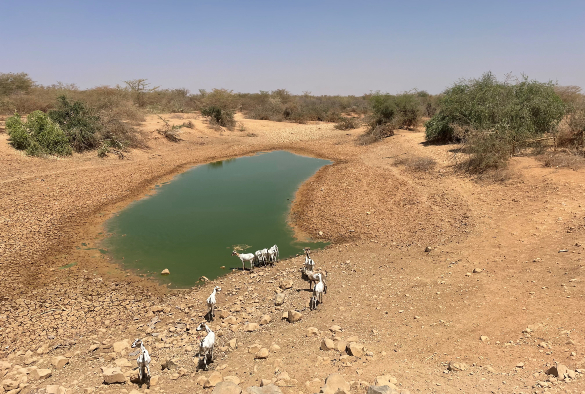
University of Liverpool researchers are developing a new forecasting tool that uses climate data to help better predict and prepare for infectious diseases outbreaks in the Horn of Africa.
The project is part of a £22.7 million funding package announced by Wellcome that will support 24 research teams from 12 countries to develop innovative digital tools to model the relationship between climate change and infectious disease.
The CLIMate SEnsitive DISease Forecasting Tool (CLIMSEDIS) will identify key climate combinations that can provide an alert for multiple climate sensitive diseases, including mosquito-borne diseases like Rift Valley Fever. The tool will allow users to implement timely, and targeted intervention strategies against climate sensitive diseases in the Horn of Africa.
The £0.5 million five-year project is being led by the University of Liverpool in collaboration with partners from Italy, Kenya, Ethiopia, Uganda and Somalia.
Project lead, Dr Louise Kelly-Hope from the University’s Institute of Infection, Veterinary and Ecological Sciences, said: “The CLIMSEDIS project is timely as it will focus on one of the most vulnerable regions to climate change, extreme weather events and infectious disease outbreaks globally. It will engage with key multidisciplinary stakeholders to better understand their needs for a digital forecasting tool and involve them assessing CLIMSEDIS to ensure it is functional, user-friendly, and acceptable. CLIMSEDIS will be freely available to improve risk assessments and implement intervention strategies in advance to help mitigate or reduce the impact of an impending disease outbreak event. This will optimise resources and save lives.”
As global temperatures continue to warm, more places are becoming suitable habitats for disease-carrying mosquitoes. Increases in extreme weather events like storms and floods can also contaminate water supplies and disrupt access to safe sanitation, causing the spread of life-threatening infections like cholera.
Action is needed now to address the risk of further escalation, including in areas where these diseases have never been reported before. By 2050, it is predicted that disease-carrying mosquitoes will reach up to 500 million more people than they do today. It is predicted that more than 1 billion people will be newly at risk of dengue, Zika, chikungunya and many other diseases by 2080.
Felipe Colón, Technology Lead at Wellcome, said: “The connection between climate change and the spread of infectious disease is often overlooked, or not made at all. This has resulted in a critical shortage of tools that model the relationship between climate change and disease outbreaks, and those that do exist are often complex and not accessible for local health official and policy-makers. Without these, decision-makers are in danger of finding themselves unprepared, leaving communities unprotected in the face of increasing disease outbreaks, risking the lives of millions.
“Wellcome is committed to addressing the urgent global health threats of both the climate crisis and of escalating infectious disease. As part of this, we are proud to be supporting 24 global project teams to design and deliver innovative digital tools that can help predict where and when outbreaks might occur, and provide early warnings to enable preparations and mitigation measures to be put in place, leading to real-world benefits for the most vulnerable communities.”